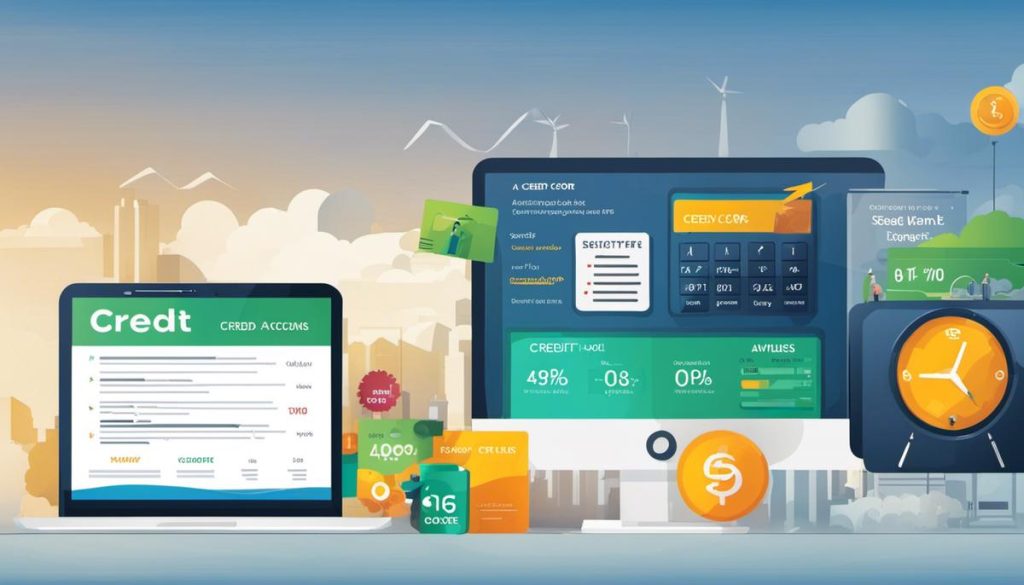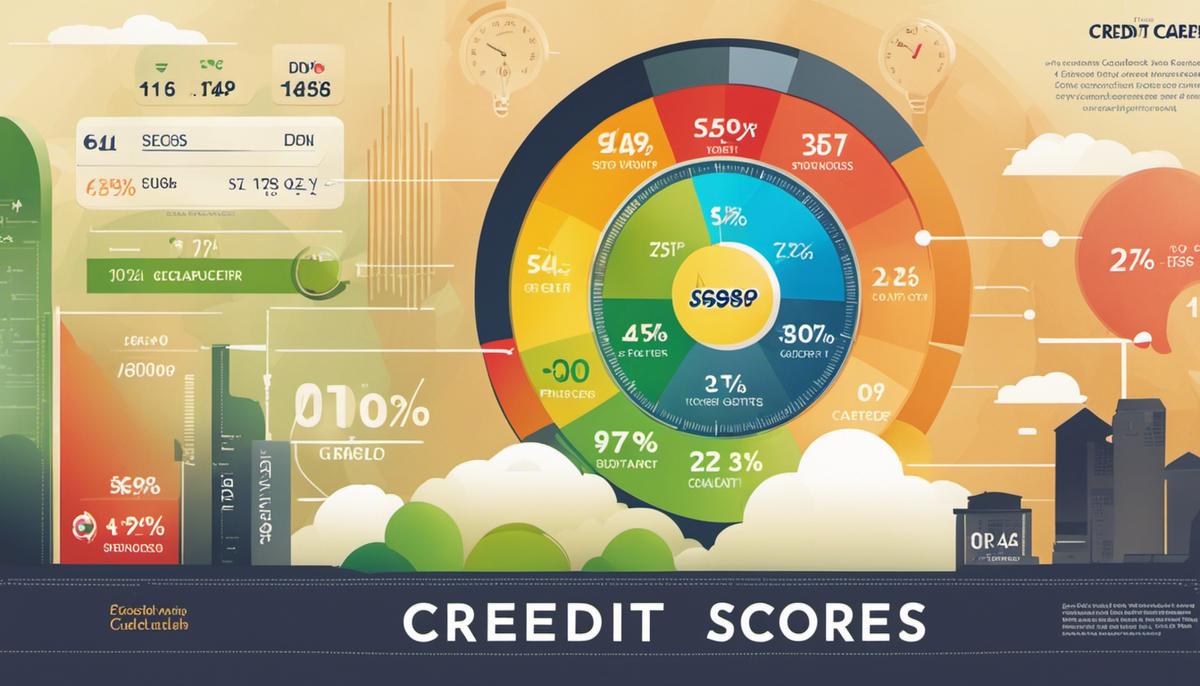In this increasingly digital and fast-paced economic world, understanding of credit scores and the role they play in financial health is not just an option, it’s a necessity. Demystifying credit scores, pointers of what leads to bad credit, and practical strategies to repair it can give individuals control over their financial future, establishing a strong foundation for prosperity. Equally significant are the development of long-term habits contributing to credit health and the prudent use of technology for credit improvement. No matter the current standing, knowledge about the essential elements of credit health can empower individuals to make informed decisions and take preventative actions that lead to financial stability.
Table of Contents
Understanding Credit Scores
Credit scores: the financial fingerprint silently shaping your business opportunities and personal finance landscapes. These three digits carry significant weight in decision-making processes in numerous sectors. From that new start-up loan, credit card application, to negotiating your insurance premiums and even rental leases – your credit score is your financial calling card.
Understanding what really makes up your credit score and the machinations of its calculation can empower you to make wiser decisions that positively impact your financial future and expand your entrepreneurial boundaries.
Defining what a credit score is, we can say that it’s a numerical expression representing your creditworthiness. It’s a figure lending institutions and creditors leverage when deciding if they should extend credit or approve a loan and at what interest rate. The higher your score, the lower their perceived risk, and vice versa. In essence, a better score labels you as a financially responsible individual.
Credit scores, predominantly in the United States, are calculated by three major credit reporting firms: Experian, Equifax, and TransUnion. These companies use different models, but most notably the FICO and VantageScore models for calculation. While the exact algorithms remain proprietary, we have an overall breakdown of the factors considered and their percentage contribution.
Payment History, accounting for 35%, is the most significant aspect in credit score calculation. Consistent, timely payments on all your accounts (credit cards, loans, etc.) will help maintain or improve your score. On the flip side, late or missed payments detrimentally impact your score.
The amount you owe or Credit Utilization forms 30% of your score. It’s recommended to keep your outstanding credit under 30% of your credit limit. Demonstrating the ability to manage and pay your debt regularly and responsibly contributes significantly to your credit score.
Credit History Length factors in at 15%. More extended credit history denotes more experience in managing money and debt. It involves both the age of your oldest account and the average age of all your accounts.
Credit Mix or the variety of credit types forms 10% of your score. A mixture of credits such as retail accounts, mortgages, credit cards, or installment loans can positively influence your score.
Lastly, New Credit accounts also impact 10% of the score. Opening several new credit accounts in a short span of time can deem you as a higher credit risk, particularly if you don’t have a long credit history.
In conclusion, comprehending the mechanisms behind your credit score gives you the upper hand when navigating your financial journey. Each aspect of credit score calculation presents an opportunity for optimization. Be strategic in your financial designs. Remember, a stellar credit score doesn’t just happen – it is meticulously built. In your journey to powerful entrepreneurship, let your credit score be the quiet testimonial of your economic acumen.

Photo by markuswinkler on Unsplash
Identifying Causes of Bad Credit
Moving forward, let’s delve into the factors that can routinely drag down a credit score and outline strategies for swiftly identifying where you could be going wrong.
The number one culprit in most cases of a bad credit score is inevitably missed or late payments. Payment history contributes to a whopping 35% of your FICO score calculation. The reality is that every late, skipped, or partial payment on your credit cards, loans, or any other line of credit you may possess will leave a negative mark on your credit history. This gives potential creditors the perception of instability and unreliability, thus impacting your score poorly.
Excessive credit applications can also lead to a poor credit score, primarily through hard inquiries. Each application results in a hard inquiry on your credit report, which can significantly lower your score, especially if the lender rejects the application. This is why it’s essential to only apply for credit when necessary and to be reasonably confident of approval.
Another key factor is high credit utilization, having already covered its importance let’s dive a bit deeper. Remember that the golden rule lies in maintaining your credit balance lower, ideally staying under 30% of your available limit. Running up high balances on your credit cards may signal to lenders that you heavily rely on borrowed credit and might struggle to pay it back.
Unfortunately, your credit score doesn’t distinguish between necessary and frivolous purchases which means overspending can quickly cause your score to drop. The principle here aligns perfectly with our entrepreneurial spirit; spend wisely and only on what is necessary to grow and thrive.
A lesser-known factor that can negatively impact your credit score is an abundance of single-type credits. Simply put, a diversified credit portfolio is preferred over a large quantity of, say, only credit cards or only personal loans. Credit mix speaks to your ability to effectively handle different types of debts, displaying financial versatilism.
Lastly, the closure of unused credit accounts can inadvertently hurt your credit score. This might counter intuitively reduce your available credit, increase your credit utilization ratio, and shorten your overall credit history length. All lending institutions prefer longevity and stability, which closing an old credit account contradicts.
In conclusion, identifying these issues begins with consistent monitoring and understanding of your credit report. Regular checks provide a clear overview of your financial health and pinpoint areas for credit improvement. If you recognize these red flags early in time and respect financial discipline, you can stave off a poor credit score even before it manifests itself. Your credit score is a numerical representation of your financial choices. Have good credit behaviors today and your future self, personal or entrepreneur, will thank you.

Strategies to Fix Bad Credit
Reviving a poor credit score is a urgent matter for any entrepreneur. Much like a Phoenix rising from the ashes, it’s never too late to rebuild and improve your credit score. Let’s delve into some proven strategies that could potentially turn your financial fate around.
Tackling Debt
The challenge starts with tackling outstanding debt, particularly for accounts that have moved into collections. Effective elimination of debt requires proper planning and strategy. Using techniques like the snowball method, where smaller debts are cleared first, or the avalanche approach, which targets high-interest debts first, can streamline your debt settlement process and boost credit score.
Creating Timely Payment Strategy
One of the key contributors to a poor credit score is late payments. An effective method to correct this is setting up automatic payments for bills. This ensures bills get paid on time, thereby reducing instances of late payments, which helps in improving your credit score.
Lowering Credit Utilization
If you’re maxing out your credit cards, it’s crucial to reduce your credit utilization ratio. Make frequent payments, keep balances low, and avoid unnecessary expenses. A lower credit utilization ratio can lead to a noticeable improvement in the credit score.
Managing Credit Applications
Applying for new credit can lead to hard enquiries on your credit report, which may negatively impact the score. Consider limiting credit applications and only apply when necessary. Instead, focus on improving the status of existing credit accounts.
Diversifying Credit Types
A blend of different types of credits such as retail accounts, installment loans, and mortgages, when managed efficiently, can demonstrate your ability to handle various types of credit. This could potentially benefit the credit score.
Keeping Old Unused Accounts Open
It could be tempting to close old and unused credit accounts, but it’s often beneficial to keep them open. The credit history length is a significant factor in calculating your credit score. Older credit accounts contribute to a longer credit history, thus improving the credit score.
Frequent Monitoring
Regular monitoring of credit reports can assist in identifying any discrepancies or fraud activities. Quick detection and correction of these anomalies could prevent credit score damage.
In conclusion, it might seem challenging to rectify a poor credit score, but with the right strategies and discipline, it’s achievable. Remember, a consistent and dedicated approach is the key to improving and maintaining a high credit score.

Long-Term Habits for Good Credit Health
Fostering a healthy credit life is analogous to leading a successful business. Two factors are integral – strategic planning and disciplined execution. After distilling the essence of credit scoring and all its components, it’s time to explore the habits that contribute to the long-term health of your credit life.
Debt management can be compared to business cost control — careful in scope yet diligent in detail. Long-term credit health depends significantly on the ability to manage debt effectively. Keep a keen eye on debt accumulation, much like managing a company’s operational costs or inventory. Prioritize eliminating high-interest debts; ensure regular prompt payments and avoid succumbing to debt traps such as payday loans. This combined approach will act as your cornerstone for a robust credit score.
No less important is designing a foolproof timely payment strategy. Consider automatic payments or calendar reminders to ensure that late payments become a plight of the past. Punctuality not only impacts your payment history but also conveys your reliability as a borrower, much like timely delivery of business projects underpins client trust.
Next, we move on to credit utilization – think of this as your market saturation rate. Expert businessmen know not to put all their eggs in one basket; likewise, consistently strive for a balanced credit utilization ratio. Spread your expenses evenly across various credit mediums and keep the utilization under 30%. This establishes a behavior of conscientious credit use, leading to a healthy credit life in the long run.
Just like businesses are judicious about the projects they undertake, similarly, exhibit prudence while making credit applications. Repeated credit inquiries show up on your credit report and could leave a negative impression in the eyes of potential lenders – similar to a business with thin spreads across multiple verticals. A disciplined approach is key.
Diverse investments are to the financial world what a diverse credit mix is to your credit score. Just as a diverse business portfolio signals resilience and adaptability, a variety of credit types showcases your savvy in managing different financial responsibilities. Balance between revolving credit and installment loans will go a long way in enhancing your credit score.
Furthermore, a well-aged credit account denotes stability, much like an established business. Rookies in business and credit alike may face initial skepticism. Therefore, retaining old, unused credit accounts, maybe an old credit card, can add weightage to your credit history length, fortifying your credit score’s foundation.
The business world salutes those who are constantly aware and adaptable. Likewise, frequent monitoring of credit score plays a pivotal role in maintaining a healthy credit life. Periodic credit report reviews act as a fine-tune mechanism for any discrepancies and provide opportunities for rectification much ahead of time, ensuring your credit life remains in check.
In conclusion, a great entrepreneur said, “The secret of change is to focus all of your energy not on fighting the old but on building the new.” So, let us commit to the discipline of these habits as we shape the new era of credit health, fostering opportunities and financial prowess in the times to come.

Role of Technological Intervention
Navigating the realm of credit healing may seem daunting, but financial technology offers a wealth of tools to help. For instance, artificial intelligence has powered up numerous fintech companies that provide custom insights, suggestions, and proactive push notifications to remind you of upcoming due dates or changes to your spending habits. This use of AI can significantly reduce the risk of missed or late payments, a key contributor to poor credit scores.
Mobile applications are also crucial. The abundance of fintech apps provide user-designed interface that allow for comprehensive monitoring and understanding of credit scores. They provide digital avenues to automate payments, monitor credit utilization, and manage debt – key strategies to improve credit health.
Machine learning algorithms, yet another essential fintech tool, makes personalized recommendations based on your spending habits and financial behavior. This includes suggestions on debt payment plans, advices on credit utilization, or reminders to keep older credit accounts alive.
While the temptations of new credit accounts are alluring, fintech tools can help you exercise credit application prudence. These platforms alert users to excessive credit applications, a key determiner to credit score health, and provide insights on the repercussions of these excess applications.
Furthermore, financial technologies for credit portfolio diversification are emerging. Robo-advisors and automatic investment applications have transformed the way individuals interact with diversified credit opportunities, making it easier than ever to nurture a diverse credit mix.
Nevertheless, security remains paramount in this world of digitized finance. Although fintech industry emphasizes heavily on secure data encryption and stringent privacy protocols, users must exercise due diligence and vigilance. Always update applications regularly, create strong passwords and refrain from sharing sensitive information over non-secure platforms.
In conclusion, fintech offers an impressive variety of tools and resources to assist users in their credit healing journey. Integrating these technologies into your daily financial management allows for a more meticulous, comprehensive and predictive approach to credit score improvement. Embracing these opportunities presented by fintech innovations is not only a smart move – it’s a game changer.

Overcoming a bad credit score is not an overnight success but a traveled path lighted by a deep understanding of credit scores, identification of the causes of poor credit, strategic planning, and execution of credit-repairing actions. Establishing consistent, positive financial habits is key to a solid credit foundation. Harnessing the power of technological innovations can streamline this process by providing tools for better budgeting, credit monitoring, and advice. Therefore, empowerment through knowledge and the use of available resources can ensure that your credit health does not whimper in the shadows, but stands in the bright light of financial confidence.

Lian Jadepeak is a Chartered Financial Analyst (CFA) with a sharp acumen for investment strategies and financial markets. With a background in finance and years of experience in wealth management, Lian offers readers expert insights into smart investing, market trends, and portfolio management. Her clear, analytical approach helps demystify complex investment concepts for both seasoned and novice investors alike.

